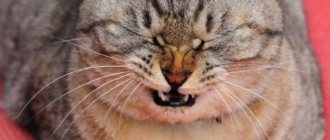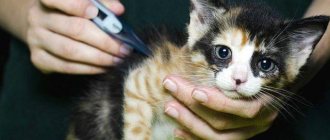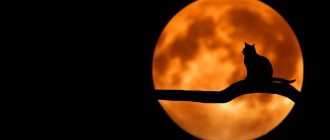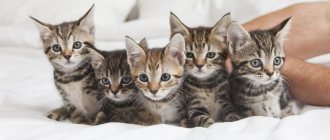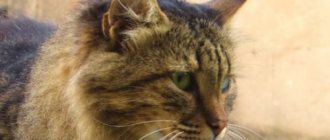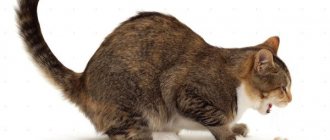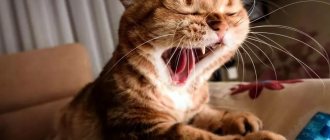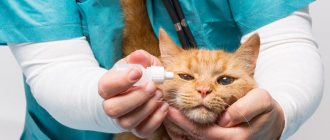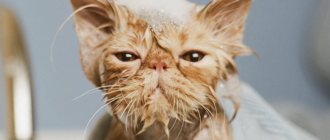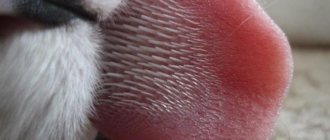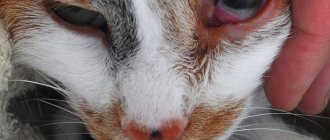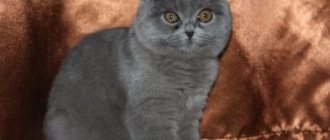A pet's excessive appetite should not be ignored. This could be a signal of serious health problems or a nervous system disorder. But most often we are talking about physiological reasons.
Finding out what happened is the main task of a loving owner. Ignoring the reasons why your cat constantly asks to eat can lead to unpleasant consequences for your pet.
Normal feeding frequency and portion sizes
The pet's diet includes store-bought dry or wet food, as well as natural food. The serving size depends on the age of the pets and their activity.
For kittens
Kittens need to eat frequently for normal growth and development. However, the volume of the portion received should be small so that the baby has time to digest the food received.
An excess of food or, conversely, a lack of it leads to disturbances in the formation of the body. Digestive disorders, obesity or nutritional deficiencies may occur. The frequency of feeding a kitten depends on its age. At the beginning of complementary feeding - 5 times, gradually the owner should reduce the frequency of feedings to 2-3 times by 6 months.
The volume of the daily portion of dry food depends on the age of the baby. So, at the age of 1-2 months, it will be enough for a pet to eat from 30 to 50 g of store-bought food per day. From 2 to 4 months, the kitten is given 40-65 g, from 4 to 6 months - 55-70 g. From six months of age, the norm of dry food reaches 60-80 g.
Wet food is also introduced gradually, starting complementary feeding with 120 g per day. Gradually, the volume of canned food or natural food is increased to 250 g by 6 months.
For adults and active animals
Food helps adults stay active and energetic. A properly selected diet should contain the right amount of animal protein, vitamins and microelements.
An adult cat is fed no more than 2-3 times a day. The amount of food depends on the weight of the pet. Dry food is given at the rate of 12-15 g per 1 kg of cat weight. So, a mustache with a body weight of 3 kg should receive about 45 g of “drying”.
Wet food and canned food are given in a volume of 60-70 g per 1 kg of weight, or 5% of the total weight of the animal. The serving size for a 3 kg cat will be 180-210 g.
Natural food for active adult fluffies should consist of meat, cereals, vegetables and dairy products. The main part of the diet is meat and offal. The animal needs to eat up to 30 g of protein products per 1 kg of weight per day. The daily intake of cereals is about 15 g, vegetables – 10 g, fermented milk products – 20 g.
For older people
The nutrition of older cats should support the normal functioning of all organs and systems and not cause digestive disorders. The menu should contain easily digestible food appropriate to the age of the individual.
In terms of the frequency and volume of portions, the diet of an elderly mustache does not differ from that consumed in an active age. If the cat is obese, the daily portion can be reduced by 10-15%.
Why does a cat constantly eat, but does not get enough and even loses weight: physiological reasons
There are times when a cat asks to eat even after it has received the required amount. Increased appetite becomes a signal for the owner - it is worth paying attention to the health of the pet and finding out the possible reasons. Sometimes this will require a visit to the veterinarian.
Worm infestation
Worms have an extremely negative effect on the body of the mustache. The cat begins to lose weight, although the amount of food he consumes increases. Weight loss, nausea, vomiting, diarrhea or constipation are the main symptoms of helminthic infestation.
In addition, the infected individual develops food preferences that are unusual for it. In general, the condition of the furry friend is depressed and lethargic. In advanced cases, helminths are visible in the vomit and feces. Antiparasitic drugs prescribed by a veterinarian can help a suffering cat who is constantly hungry.
Problem with nutrient absorption
The furry glutton has difficulty absorbing nutrients. Because of this, the mustache feels hungry and asks for food too often. Absorption disorders are symptoms of a serious pathology. These include malignant neoplasms and problems with the pancreas.
Hormonal disorders
Disturbances in the production of hormones lead to the fact that the cat constantly asks for food. Problems in the functioning of the endocrine system cause the development of diabetes, kidney failure, hypothyroidism and other ailments. In addition to a strong desire to often approach the bowls for food, sick individuals exhibit a strong thirst.
Only a veterinarian can diagnose disorders. He also prescribes appropriate treatment to maintain normal condition.
Starvation, exhaustion or insufficient portion size
Increased appetite in pets is a consequence of forced starvation or exhaustion. Some veterinary procedures require the animal to fast for long periods of time. And sometimes the animal gets lost and spends a long time without food.
A hungry person pounces on food and asks for more even after feeding. In this case, overeating, which is bad for digestion, should not be allowed. Portions should be small, but an exhausted mustache should be fed frequently.
Pregnancy in females
All pregnant individuals eat a lot, going to the bowls even after feeding. During this period, a lot of nutrients and vitamins are required for the normal gestation and development of newborns in the womb of the cat mother.
If a pregnant cat is constantly hungry, then her menu should be changed. High-calorie dishes enriched with vitamins and microelements are suitable for feeding. It is not recommended to overfeed the expectant mother, so as not to cause complications during childbirth.
Extreme cold
On cold days, the mustachioed friend's body spends more energy to heat itself. To replenish energy loss, the animal needs more food. During the winter and autumn, the owner should increase the serving size and increase the nutritional value of the dish - then the mustache will not often look into the bowl.
Taking medications to suppress hunger
Medicines prescribed to treat various diseases provoke too much appetite in your pet. This is how enzyme, anticonvulsant and hormonal medications act on your furry friend. Increased hunger is a side effect of medications.
Health problems
Many diseases can cause cats to have an insatiable appetite. The list of such problems is simply huge; only a veterinarian can make an accurate diagnosis. But the most common ones are:
- Intestinal parasites (popularly known as worms) that compete with animals for food.
- Benign tumor.
- High or low blood sugar levels.
- Inflammatory diseases of the gastrointestinal tract, due to which not all food is absorbed in the body.
Also, extreme hunger can be caused by taking certain medications, such as steroids.
Why does my cat always ask for food even though he's not hungry?
The desire to snack in individuals of any age is caused by both physiological and psychological reasons. They cannot be ignored, because in advanced cases they lead to the development of chronic nervous conditions.
Competition for food with other pets
Living in the same house with other pets makes you want to be first at the food bowl. Even a mustache that has eaten a hearty meal will not want to give the food left on the plate to its relative. The greedy person will try to be the first to be at the feeder and quickly eat not only her own, but also someone else’s portion.
Eating stress
False hunger is a sign of psychogenic polyphagia, which occurs against the background of eating disorders. An excessive increase in appetite develops due to severe emotional shock. Stress is provoked by various reasons: long separation from the owner, a trip to the veterinarian, change of place of residence.
Lack of attention
Fluffy pets really need care and affection from their adored owner. If the owner ignores the pet’s desire to take him on his lap and caress him, then sooner or later the animal will begin to suffer from lack of attention. Your furry friend will be worried and bored.
To attract the attention of a person, the cat will begin to constantly ask for food. This is not only an opportunity for him to attract the owner, but also a way to cope with stress.
Fear of hunger in street animals
Homeless mustaches survive in very difficult conditions, so they are always in search of food. Even when they find themselves in a family of loving owners, former street animals do not immediately get rid of old habits.
Cats are afraid of hunger, so they too often go to the bowl of food and wait for more - so that they can eat for the future. Individual comrades can stock up by hiding food in different parts of the house.
Causes of the symptom
Polyphagia, as a symptom, is not always a consequence of poor nutrition or gluttony of the cat, as many believe. Its causes are both psychological in nature and are the result of some dangerous diseases.
Experts note the following reasons for overeating in cats:
- Behavioral factors. Cats, like people, have individual dispositions and temperaments. When a cat who has never been outside, never caught mice, and had access to a bowl at any time gets old, he often becomes phlegmatic. He eats a lot and his stomach volume gradually increases. Over time, obesity may occur - after all, the cat not only eats a lot, but also moves little.
In what cases should you contact a veterinarian?
There are situations when the owner should not hesitate to visit the veterinary clinic. Sometimes a cat constantly asks for food because it is suffering from serious illnesses, and hunger is just one of the symptoms. Other warning signs include:
- vomit;
- temperature increase;
- digestive disorders;
- weight loss;
- apathetic state;
- dulling of fur;
- discharge from the eyes or nose.
A sick pet often seeks solitude and tries to dodge the caresses of its owner. Sometimes a suffering mustachioer cannot stand being in bright rooms, trying to crawl under a table or bed. Such signs, along with a feeling of excessive hunger, are symptoms of health problems.
Your cat has hyperthyroidism or diabetes
For your information, diabetes can also be a consequence of overeating, and not just the cause. Both diabetes and hyperthyroidism cause a significant increase in appetite:
- With hyperthyroidism, this happens because your cat's metabolism burns too many calories.
- In diabetes, this happens because your cat's body cannot convert sugar into energy, so the nutrients don't even reach their destination. If your cat is always hungry, constantly eating and losing weight, and especially if she drinks a lot of water, take her to the vet as soon as possible!
How to keep your pet's weight within normal limits
A veterinarian will help you find out the nutritional norm. In addition, approximate daily allowances for mustaches of different ages and different body weights are indicated on food packages.
Should I limit the amount of food I eat?
Restrictions on the amount of food will only help those pets who suffer from excess weight or food allergies. A special diet is provided for such cats. By adhering to a certain regime, the glutton will restore normal body weight and will be able to lead an active lifestyle. In other cases, restrictions on the volume and frequency of feeding are not correct.
How to tell if your cat is malnourished or obese
An attentive and caring owner always sees when something happens to his pet. Problems with underweight or excess body weight are very visible. Obesity is characterized by low activity, the appearance of fatty deposits and folds. Thinness is noticeable through too sunken sides and a protruding spine.
The owner’s main task is to find out the cause of the pet’s painful condition. It is impossible to do this on your own. Only a veterinarian can make a diagnosis and prescribe treatment.
Maintaining a normal psychological state
The best cure for any stress and neurosis in a furry friend is care, affection and attention from a person. Love works wonders, so a simple stroke will help distract the cat from adversity.
The mustache will not have to eat stress if the owner plays with it or picks it up. You should not leave your furry friend alone for a long time, so as not to provoke negative changes in the psyche.
To prevent your furry pet from being too intrusive in its desire to feed itself beyond the norm, you need to pay enough attention to it, look after it, and monitor its diet. We must not forget about regular visits to the veterinarian, quarterly deworming and annual vaccinations.
A physically and mentally healthy cat or cat will not constantly ask to eat and sit near the bowl. A balanced menu will provide enough strength and energy for an active life. If alarming symptoms are detected, you should contact your veterinarian.
The article is of a recommendatory nature. Contact a specialist!
Symptomatic diet and procedures
Whatever the cause of polyphagia, it is important to monitor your cat's diet and lifestyle.
For example, an animal’s daily diet should include porridge, fermented milk products, grass, and stewed vegetables.
You should not give your cat food if he is full. Overeating is often provoked by the breeders themselves, fulfilling all the wishes of the pet.
It's also helpful to remember that we have pets for more than just feeding them and cleaning up the litter box. You need to communicate and play with the animal, pet it, “scratch it behind the ear.”
If the cat has had to endure stress, it is necessary to compensate for the loss of positive emotions. But this cannot be done with the most delicious food. You can calm your animal with herbal sedatives (but don’t forget to consult your veterinarian first).
If the cause of overeating is illness, it is important to replenish the loss of important microelements and vitamins. For this, veterinarians recommend using special supplements and vitamin complexes. They will help the animal recover faster and also strengthen the immune system.
